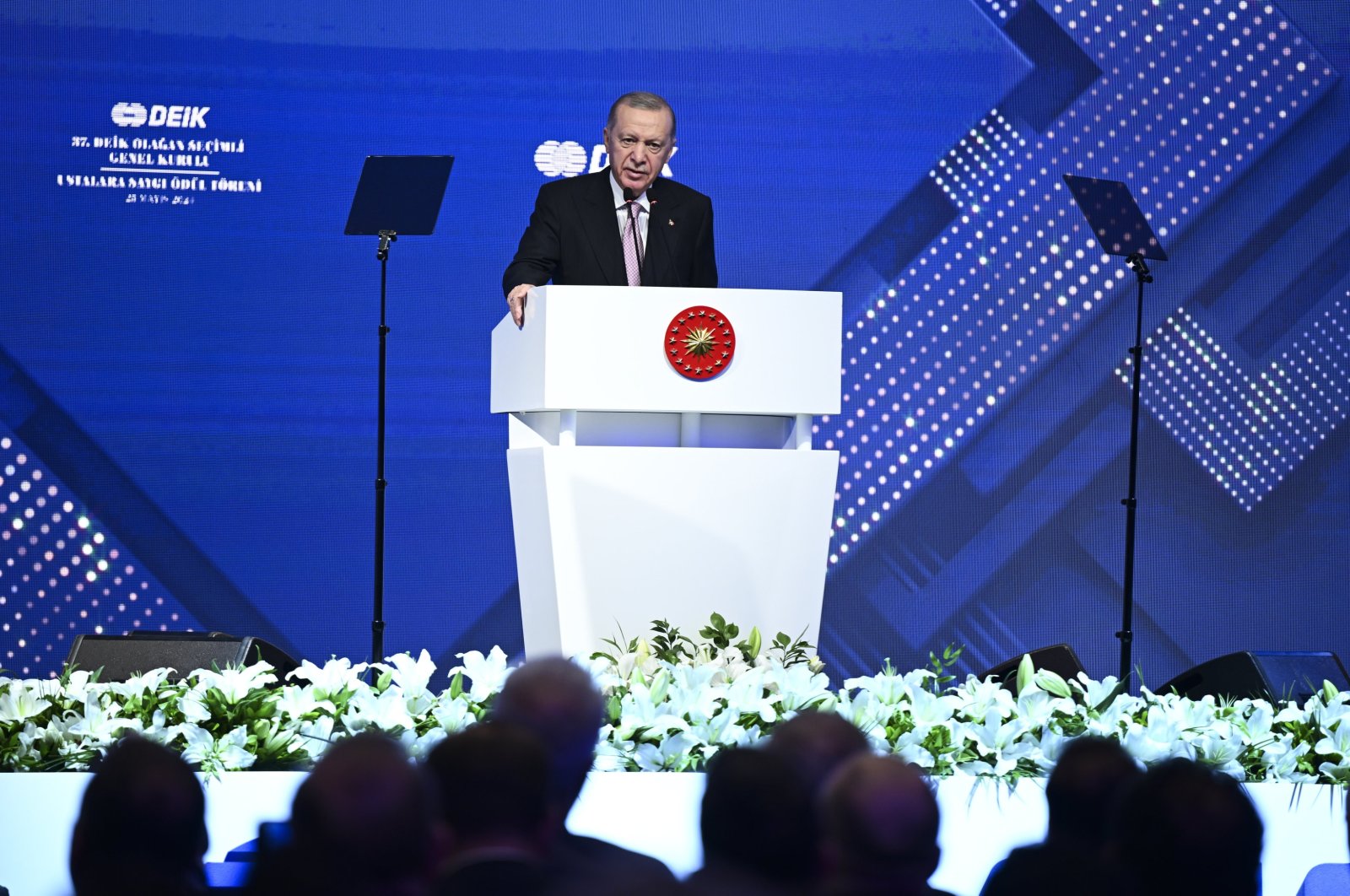
President Recep Tayyip Erdoğan said Saturday Türkiye's primary economic priority was to reduce inflation to single digits and increase prosperity as he reaffirmed the expectations for the drop in annual inflation readings after the peak in May, adding the country would enter a disinflationary period in the second half of the year.
"We will enter a disinflationary period starting from the second half of the year. Market expectations strongly support our forecasts," the president said. "We will not allow additional inflationary pressure through our fiscal policy," he added.
Addressing the General Assembly of the Foreign Economic Relations Board (DEIK), Erdoğan said annual inflation should peak in May before cooling, echoing the forecasts of the central bank and offering his latest endorsement of the economic program.
The economic program mainly aims to lower inflation to single digits, Erdoğan said. "We are aiming for a sustained drop in inflation, not temporary relief," he added.
After winning reelection last May, Erdoğan installed a new economy administration that delivered aggressive tightening and unveiled a medium-term program aimed at arresting inflation, curbing chronic deficits, rebuilding foreign exchange reserves and stabilizing the Turkish lira.
Annual consumer price inflation was near 70% in April and is expected to touch about 75% this month, with a projected decline in headline inflation starting in June.
The central bank has aggressively hiked interest rates to 50% from last June through March this year to tackle inflation. In its latest meeting last week, the bank held the benchmark rate steady for the second consecutive month, as expected, but remained wary of inflation risks.
Most recently, the governor of the Central Bank of the Republic of Türkiye (CBRT) Fatih Karahan said, "At this point, we are on brisk of disinflation," adding we "are pleased to observe a weakening in the main trend of monthly inflation, despite its high level."
Treasury and Finance Minister Mehmet Şimşek on Friday reiterated the "main goal of our program is disinflation," adding that as its positive results continue to be seen "the maturity of international capital inflow will become longer."
"As our rule-based and predictable policies succeed, confidence increases, portfolio preferences shift toward the Turkish lira, and capital inflow into our country accelerates. As foreign interest in Turkish lira assets grows, our banks and real sector secure long-term and more favorable funding from abroad,” he said in a post on X, formerly Twitter.
Erdoğan on Saturday similarly cited the growing interest in local and foreign investors in Turkish lira, rising portfolio inflows in the last one and half months, and the upgrades of the credit rating agencies, which came one after another.
He also highlighted the improvement in the current account balance and the fall in the CDS risk premium, which declined to pre-pandemic levels.
Acknowledging the efforts of DEIK in achieving record exports of over $255 billion last year, he said, "As of April, annual exports reached $257.6 billion. In the January-April period of 2024, exports increased by 2.7% compared to the same period of the previous year, reaching $82.9 billion."
Current account balance
"The annual current account deficit, which had reached $57 billion last year in May, decreased to $31.2 billion in March," the president said. "Excluding gold and energy, the current account balance had a surplus of $36.1 billion annually. I believe the improvement in the current account deficit will continue," he added.
Moreover, he said that with a 4.5% growth rate, Türkiye ranks first in Europe, second in Organization for Economic Cooperation and Development (OECD) countries, and fourth among G-20 countries.
President Erdoğan stated that Türkiye closed the last year with good figures in many areas, from tourism to informatics, from health tourism to logistics despite the inflation woes.
As part of his speech, he also touched upon the recent upward trend in the central bank reserves and said, "Our gross reserves, which were $97.1 billion in May last year, increased by $42 billion to $140 billion. The improvement in net international reserves excluding swaps in the last one and half months was $50.7 billion."
"We stand by everyone who works for Türkiye, exports for it, increases their investments by trusting the Turkish economy, and supports the building of the 'Century of Türkiye,'" Erdoğan said.
Additionally, he also cited the steps undertaken to increase the contribution of exports to growth and to achieve the target of balanced, high-quality and sustainable high growth such as bolstering the capital for the state-owned export credit agency and increasing the daily rediscount credit limit to TL 3 billion.
Erdoğan also said the government is implementing a new industrial policy, and will redirect funds to priority areas through its public savings and efficiency package.
Türkiye is supporting technology-focused investments in critical sectors, he said, adding that the country places great importance on achieving green and digital transformation.
"Türkiye's name is increasingly coming to the forefront in the search for production centers as an alternative to Asia," the president noted.
